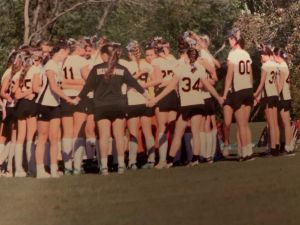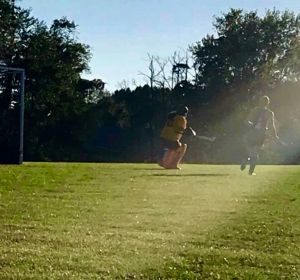Every player looks forward to each sports season. Whether it be getting into shape during pre-season, running drills during practice or simply picking captains, everyone can’t wait to play in the very games that they trained so hard for that season. But what if you got robbed of your season all because a coach favored another player over you?
Before my senior year of high school, the field hockey team received a new coach. He’ll be known as Coach Pearce. At first, I thought Coach Pearce was a nice guy. He seemed very easy to talk to, cut down running from two miles to one miles and didn’t make any cuts that year.

My initial thoughts slowly vanished beginning with the first game of the season, after he played the sophomore goalie as the starter instead of me. I was crushed. I was heartbroken. Who wouldn’t be? But I didn’t automatically think that it was favoritism. I thought that she was better than me, so I started to practice more on my own in order to improve to become a starter with the rest of the other seniors.
The next day before practice, I talked to Coach Pearce about why I wasn’t the starting goalie. He said that he liked the way the other goalie (let’s call her Shelby) played compared to my style of goaltending. I started to change my goaltending style because he promised that I would start the next game. That didn’t happen.
This same pattern kept repeating itself a few more times until it became clear to me that Coach Pearce simply liked Shelby more than me during an away game. During warm-ups, Shelby was having an off-day and barely blocked any goals. Several players went to Coach Pearce and told him this and suggested that I start the game instead of Shelby. Coach Pearce had Shelby play the entire game and we lost 4-1.

I switched up my goaltending style. I practiced more and more on my own. I worked out harder than I ever had before. It didn’t matter to Coach Pearce. Shelby was the starting goalie. It didn’t matter that she had less experience than me. It didn’t matter that it was only her second year playing field hockey compared to my eight years playing the sport. It didn’t matter that she wanted to be a field player rather than a goalie. In his eyes, I would never be better than Shelby.
About halfway through the season, I went to the athletics director and explained the situation. I told her that I understood that I was not guaranteed to play every game, but what Coach Pearce was doing was blatant favoritism. She told me that she would email him and then Coach Pearce and I would sit down and talk about the situation.
We never talked, but he did play me more in games. However, he would play Shelby for the first 10 minutes of every game and then play me for the rest just as a little reminder that I was not the starting goalie.
Even though I did eventually get more playing time, I still felt as though my senior year of field hockey was robbed from right under me simply because I wasn’t the coach’s favorite.
According to Competitive Edge, “good coaches treat their athletes fairly. They don’t operate with two different sets of rules.” The article continues to say that coaches having favorite players can lead to a divide in the team, which could affect the team’s overall performance.
However, Changing the Game Project posted an article by James Leath about why he picks favorites. Leath does agree with the fact that coaches shouldn’t pick favorites based on personal biases, but instead look for specific characteristics in his players, such as punctuality, commitment, adaptability, aggressiveness, a “growth mindset” and confidence. Leath explains that he does pick favorites based on these characteristics. In other words, his favorites are the players that show up on time, committed to the team and work hard for every practice and game.
If you’re facing an issue with a coach picking favorites and want more recognition, USA Today High School Sports offers a few tips to help you.
First, it is best to communicate with your coach. “In a level-headed manner, have your athlete ask the coach what they can improve on, and let them know that they will work hard to get a shot at more playing time. It’ll also help keep them on the coach’s radar for the near future,” Jason Smith said in his article in USA Today High School Sports.
Next, it helps to put in extra time. After talking with your coach about their recommendations to improve your skills, you need to show your coach that you are committed to improving your skills in order to get more playing time. “This may mean arriving early to practice or staying late in the gym, but the extra time they put in will help them close the gap on their teammates,” Smith said.
Then, you need to stay positive throughout this whole experience. Whether it be your confidence, body language or overall attitude, coaches are more fond of players that express a positive attitude. According to Smith,“You’ll also want them to be a good teammate and support everyone on the roster. Coaches love athletes that make the whole team better and don’t just think about themselves, and taking a positive, team-first approach is a great way to stand out.”
Afterwards, you can make yourself be seen by your coach by making an impact on your team. The best way to gain recognition for your efforts is by making sure the coach notices your efforts. “Looking to get an extra workout in? Trying to get the team fired up? Make sure to do it when the coach is around and get recognized for the extra time and effort that you’re putting in,” Smith said.
Finally, not only do you need to work harder but also work at having fun as well. Winning is great, but sports are also about having fun. According to Smith, in order “to have a truly rewarding sports experience, focus on giving it 100 percent and doing your best, even if you’re not the best player in the game. That’s a recipe for success in sports and beyond.”



